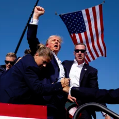Cuba holds one-party vote as post-Castro era looms
-
Recently Browsing 0 members
- No registered users viewing this page.
-
Topics
-
-
Popular Contributors
-
-
Latest posts...
-
4
Trump-Epstein Breakup Due to Employee Poaching
People are saying -- if it quacks like a duck, it's Donald! -
142
Obama referred for criminal prosecution
We'll remember that next yr at our 1st annual MAGA yacht club meeting. -
146
Middle East Israeli forces kill 63 Palestinians in Gaza within hours of ‘humanitarian pause’
That just proves there are different opinions on the subject because Israel is a democracy. Read the following. AJC: Israel is Not Committing Genocide https://www.ajc.org/news/israel-is-not-committing-genocide https://www.ajc.org/news/american-jewish-committee-decries-amnesty-internationals-report-on-false-genocide-charge New Yor Times: No, Israel Is Not Committing Genocide in Gaza https://www.nytimes.com/2025/07/22/opinion/no-israel-is-not-committing-genocide-in-gaza.html -
273
Is Trump actually doing a better job than you expected?
I’m not an economist just a regular lay person who doesn’t see the world through trump colored glasses. There was a bipartisan fix to the border that trump killed now we have goons disappearing people off the streets and completely disregarding our constitution.created a sex trafficking crises?just what drug are you on?inflation was worldwide not just here it was a reaction to Covid.naa you are looking through your trump colored glasses like the imbecile you are. -
6
UK grooming Gangs.
It's going to open a can of worms now keeps so Starmers keeping out of the way. Lets see them try and cover up this. -
5
Almost nobody seems to care about what I care about: Same with you???
Speaking of RAGE..... i am thinking about the Self-Destruction Hypothesis. I am also thinking about the......GREAT FILTER...... It's one thing to rage against the natural brevity of an individual life, as fondue zoo eloquently put it. It's an entirely different and more frustrating rage to think our entire species might not even get its full shot, instead choosing to self-destruct with the very tools we created to prosper. That's the ultimate unforced error—the possibility that we become our own filter, wasting our one and only chance on a cosmic scale. I do believe that the GREAT FILTER affects us all..... Do you?????
-
-
Popular in The Pub









Recommended Posts
Create an account or sign in to comment
You need to be a member in order to leave a comment
Create an account
Sign up for a new account in our community. It's easy!
Register a new accountSign in
Already have an account? Sign in here.
Sign In Now